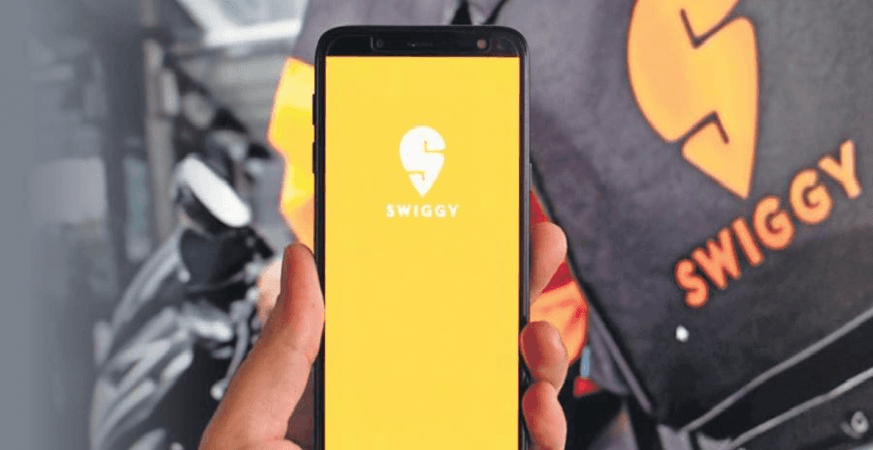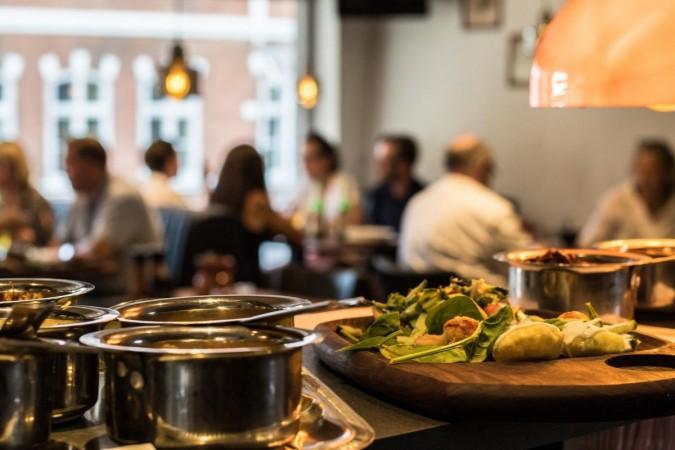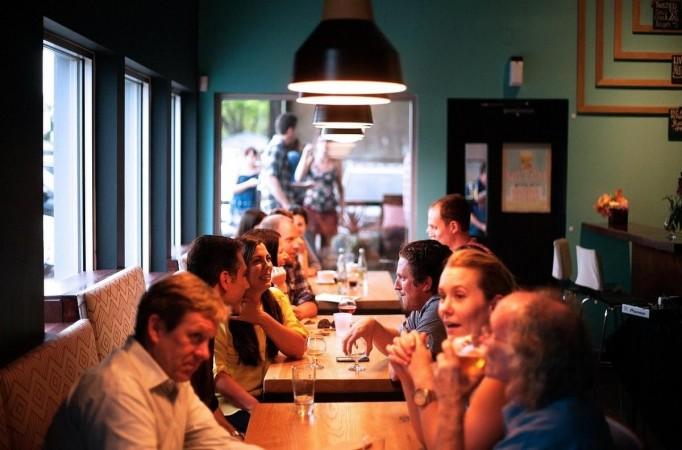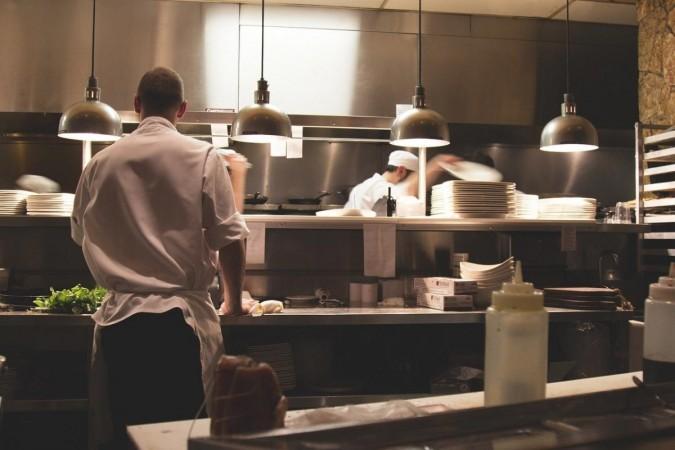As you see, the consumption today is clearly shifting over the years towards food delivery, and the laws are working mostly in favour of the aggregators. Katriar asks, "Where is the parity today when lakhs of small and large-scale traders are suffering to satisfy the greed of only half a dozen aggregators?"
This is where the restaurant industry needs policy reforms, liquidity support, and government intervention.

Anurag Katriar, President, National Restaurant Association of India (NRAI) and Executive Director & CEO, deGustibus Hospitality shares views, ideas, and reasons for turtle-paced growth of the F&B businesses in India, in an exclusive conversation with IBTimes India.
Voicing against food aggregators viz. Swiggy, Zomato, and the likes
"Who are these aggregators?" Katriar questions. "They are a market place, a digital tech platform set up wherein buyers and sellers come to trade on their own terms. But today, these aggregators have become like digital landlords, in control of who can visit or not, the discount on offer and above all, also getting access to all customer data, which ideally should be owned just by the restaurant businesses. When you order food from a restaurant, you are a customer of the restaurant and not a Swiggy or a Zomato customer, they are the intermediary food delivery aggregators."
Discounts offered by the food aggregators today are funded by restaurants. Katriar expresses, "We demand that your platform-driven discounts should not exceed the X number of days in a year. The restaurant owners should take charge, and it is their business, they should decide when to offer discounts and how much they can offer, and not the food delivery platforms (aggregators)."

In a larger context, it seems like the food aggregators are feeding on the false narrative created around Indian consumers, that they do not care about the quality of food, but are more driven by discounts. "I take a huge objection to this narrative because Indian consumers value what they are getting, but yes discounts do help. It's not like discounts did not exist before Swiggy and Zomato came into play, they existed. But then the difference was that it was at the discretion of the owners and not the brokers. Owners decided when to give the discounts (say on which day of the week, which hour of the day or which month of the year). However, if discounts are offered every day and not at a particular time, day or year, how will the restaurant continue to remain special in the minds of the people?"
"The aggregators are nothing but neutral market players, and they cannot force restaurant owners to buy a complete bouquet of services. For instance, if you want to enroll in your restaurant to be listed on Swiggy or Zomato, you will have to compulsorily buy their delivery service. If you do not take their delivery, they wouldn't even enroll you. So they should be made to become a marketplace where traders, buyers, and sellers come and operate according to their own terms. Aggregators cannot dictate terms to F&B businesses and restaurants that you need to give a 50% discount on a certain day to consumers because it's Swiggy or Zomato's birthday, or under campaigns such as Happy Swiggy Monday or No Cooking January, and likes of these. Also, data should be owned by the restaurant business owners and not by the food delivery platforms."
Now if you are a marketplace, you cannot be a trader in the marketplace. What are Swiggy and Zomato doing? Swiggy has its own kitchen, it has its own brands, which means now owning data of restaurant consumers' they end up creating rival brands? This is the reason Katriar emphasizes on the need to form a strong e-commerce policy.
"The current government had formed a group of secretaries to establish the same, however unfortunately due to unprecedented lockdown and Covid-19 pandemic, things seem to have gotten off the radar."
Zomato announced a $293 million loss in 2019, other food aggregator delivery platforms are also losing money, and a year-round discount means the government is losing tax money, so who is benefiting in this entire system? Not even the consumers, because most of the consumers know exactly what they want.
Katriar thinks, the only thing that is winning in all this, is the valuation of these few aggregators because they are not linked to any profitability or performance, but they are linked to the number of clicks - how many people ordered? On this basis, the GMV valuation is done.
He further asks, "Is it fair to ruin an entire sector to benefit the enterprise value of few aggregators?" Hence, policy support here is so important to plug the loopholes in the system.
Restaurant businesses combating Covid-19, in the fight to survival
In these grim Covid-19 times, the government of India has done little, not much to support the survival of the restaurant and F&B sector in the country. The financial relief announced for MSMEs by Finance Minister Nirmala Sitharaman fixes the quantum of loan that restaurateurs can avail at Rs 5 lakh. This proves to be of no significant help for the ailing hospitality sector.
While metros of India are gradually opening up post lockdown, many fine-dine restaurants, casual-dining restos, high-end chains, and standalone cafes are pulling down the shutters in the oncoming few weeks. As lease negotiations with landlords requesting deferment of dues by restaurateurs fail to materialize, will the hospitality sector revive itself in the Covid-19 era of tomorrow?
Katriar opines, "Covid-19 crisis is a highly unprecedented issue, it will be changing the way consumption works. There is backward integration at every step, that will be supported once the consumption resumes because the hospitality industry uses a multitude of products and services to bring you that one meal on your plate. So each time you dine out in a restaurant, you are contributing towards the economic upliftment of all these service providers in the ecosystem."
The hospitality sector is the second-largest employment provider after agriculture in India, providing employment to around 7.3 million people. With no policy and liquidity support from the government, a lot of restaurants are shutting down and the industry witnessed about 30% job loss which means 22 lakh people approximately have lost jobs during the past few months.
"If we do not survive, there will be no revival of the trade or the economy," Katriar asserts. The government can prevent job losses and shut down of restaurants, by extending the tenure of licenses for one more year without charging any fee (free of cost). This will provide one significant reason for restaurants and F&B outlets to NOT shut shop. When restaurants open in time, the consumption will continue to grow slowly, but the change cannot be witnessed overnight."

In Maharashtra for example, out of the total budget of the excise department, which is one of the biggest revenue sources for the Government of Maharashtra, only 2% comes from licenses, whereas 98% comes from trading. So extending the duration of licenses and increasing chances of trading could help boost consumption.
With more and more people now working from home, the concept of working lunches has lost its place, so has the 'drink after work' not in use anymore by office-goers. This in a way has impacted revenues of restaurants, bars, and banquets. Social distancing norms would mean the bars and the banquets will suffer a lot further.
The UK's "Eat out to help out" scheme encouraging customers to dine out
As recently, the UK chancellor Rishi Sunak trialed government-backed "Eat out to help out" discount scheme for customers to save the F&B outlets and restaurant businesses in the country.
To get customers back into restaurants, cafes, and pubs and protect the 1.8 million people who work in them, Sunak announced for the month of August, "We will give everyone an "eat out to help out" discount, which means meals eaten at any participating businesses (restaurants) between Monday to Wednesday will be given 50% off up to 10 pounds per person, for everyone including children."
Businesses need to register on a website and each weekend, they can claim the money back from the government - funds will be transferred directly into their bank accounts within five working days. "1.8 million people work in this industry, they need our support and with this measure, we can all eat out to help out," Sunak added.
Encouraging people to eat out often, there will be no limit placed on the number of times, customers can use the offer during the period of the scheme until August 31, 2020. However, customers cannot get a discount for someone who is not eating or drinking, and alcohol and service charges are excluded from the offer.
Should India emulate similar creative strategies for the survival of the F&B sector?
"I think Rishi Sunak has looked out-of-the-box by introducing the 'Eat Out to Help Out' scheme in the UK, boosting consumption to ensure that the economy kicks off once again. I think logically speaking it is the best way - the moment people start spending money the cycle of the economy will get kick-started again. By offering a discount of 50% between Monday to Wednesday for registered businesses and reducing VAT from 20% to 5%, Sunak has managed to get two things right at one go. For restaurants, reducing VAT means actual money paid by the customer gets reduced to that extent, and above that 50% of discount spending allowed will be reimbursed to restaurants by the UK government."

"While there are no details on the budgetary outlay by the UK government for the introduction of this scheme, it is a very innovative concept introduced to save the F&B and restaurant industry in the country. However, the introduction of such a scheme could be possible in a developed nation as the UK, wherein the population is only one-twentieth of India," Katriar opined.
"India is an agriculture-driven economy and agriculture still forms the biggest contributor to GDP. Indians have a socialist mindset, wherein eating out is considered a luxury and drinking is a sin. In such a case, you cannot expect the Government of India to be introducing similar schemes like the UK, and funding "eat out to help out" in our nation. For the Indian restaurant industry to survive, it is very important that the input tax credit is restored and the very absence of that, is costing us about 10% of sales, which is a lot of money to waste right now, especially when the going is tough."
Also, in India, F&B businesses are fueled by discretionary expenses, and today when incomes are down, jobs are being lost and recession is around the corner, it is very difficult to start consumption in the F&B trade as the UK government is doing right now. "The UK has reached the revival stage, while we in India are still in the survival stage."
For Indians however, eating out is an occasion and the second plus being, the size of the domestic market is massive. So the problem continues to remain in India unless the consumption kick starts there are little chances for the economy to start growing.
What should the Government do to ensure the restaurant industry survives?
Katriar suggests two off-hand policies that the Government of India (GoI) should implement to ensure that the restaurant industry manages to tide over the crisis. They are:
- Offering input tax credit on GST, which will provide a huge impetus to the sector
- Frame and implement a national e-commerce policy around food delivery
The restaurant association has also written to the honourable Finance Minister Nirmala Sitharaman, to implement something on the lines of "Make in India, such as 'Serve in India' for the restaurant sector.
Katriar suggests, "Imagine if the Government opened up a certain swath of land which can be developed into dedicated Food and Beverage centres, through public-private partnership (PPP) arrangement, then these hubs will generate revenue for the government and also for the F&B industry as well."

"As regards, liquidity support what the government can do is - provide working capital to the restaurant businesses with six months moratorium at lowest possible interest rates with limited collateral requirements. While some of it has been covered by the MSME announcements made by the FM recently, it's not covering everyone. It is only helping people who have loans in their books and they are top-up loans. So it's almost like penalizing restaurants or companies who do not have loans in their books."
Looking into the not-so-distant future for F&B in India
"There is an assumption that our economic activity will churn out only in large cities, I think Tier II and Tier III will also pick up in the affordable dining segment and this growth will gradually move towards the luxury and fine dining segment in the near future. The government can do nothing much more than ensuring that people have money in their hands and giving them all the policy and liquidity support to survive," Katriar suggests.
Besides seeking support from the government, we have to understand that the Indian government will have to look at the welfare of the poor and needy as well. What restaurant businesses have to do right now, is to make sure that every possible expense is reduced, every stakeholder comes together and renegotiates the terms of engagement without looking back on the old terms as the benchmark.
"It is important to reimagine the businesses today and move towards an asset-light and low-risk model, for now, reduce appetite for growth and consolidate (do not open too many new things). This could mean that there may be no new capital coming into the sector, which is fine, let the sector survive first. Only if the sector survives, then can much be done to revive and improve in the near future."

















